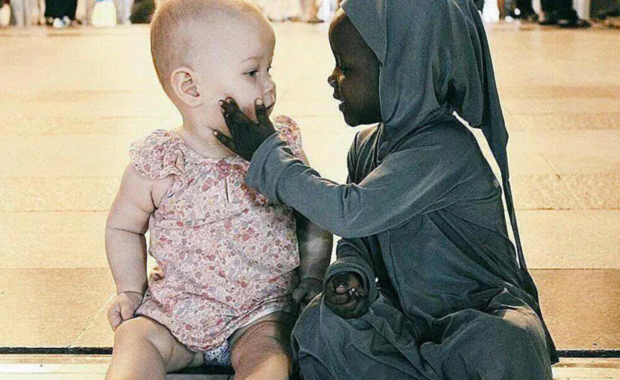For at least 50.000 years, humanity has been on a journey of separation – pulling back from nature and becoming ever more differentiated, individuated, and empowered.
In recent decades, we have become so sominant as a species that we are producing Earth-changing trends-global warming, species extinction, unsustainable population, massive famines, waves of migration, and more – that threaten humanity’s future.
Now, with stunning abruptness, humanity is being challenged to turn from the familias path of progressive separation to an unfamiliar path of global caring and cooperation.
The transition from self-serving separation to world-serving cooperation con-fronts us with an evolutionary crisis: Who are we? What kind of Universe do we live in? Where are we going?
Our view of the Universe profoundly impacts how we live in the world. if we think we live in a Universe that is comprised of non-living particles without meaning and pur-pose, then it makes sense to exploit that which is dead on behalf of our-selves, the most visibly alive.
Alternatively, if we have direct experiences of connecting with the aliveness in nature and the world around us, then it is natural to respect and care for the countless expressions of aliveness.
These are two radically different ways of looking at the Universe and, in turn, produce dramatically different views of our identity and evolutionary journey.
This leads to a startling conclusion: The most urgent challenge facing humanity is not climate change, or species extinction, or unsustainable population growth; rather, it is how we understand the Universe and our intimate relationship within it. Our deepest choices for the future emerge from this core understanding.
At the Evolutionary Crossroads
How have we come to such a critical crossroads in our evolutionary journey?
First, in the last several hundred years, we have been spectacularly successful inexploiting the abundance of the Earth’s resources to create a short period of unprecedented material prosperity for a minority of the Earth’s population.
This burst of affluence emerged from a worldview described as ‘scientific materialism,’ which regards the Universe as unaware of and indifferent to human existence in the unthinking and unfeeling dance of dead particles in a cosmic system without urpose or meaning.
Second, based on this worldview, we have been consuming the Earth’s resources far beyond fer rates of reeneration. Short-term material properity is being gained at the cost of long-term ecological ruin.
As Wendell Berry reminds us, nature “has more votes, a longer memory, and a sterner sense of justice than we do.” We are creating by our own hand a long-term future that is unforgivingly inhospitable for advancing human civilization.
We are now being compelled by circumstances to come together – collectively and rapidly – to cope with profound climate disruption, massive human migrations, unsustainable populatiom growth, critical shortages of key resources such as water,  the threatened extinction of nearly half of all animal and plant species, and much more.
the threatened extinction of nearly half of all animal and plant species, and much more.
As world-changing trends of enormous magnitude converge and amplify one another, the people of Earth will confront the unyelding reality that, unless we wake up and work together, we have onle the legacy of a grievously wounded Earth and impoverished future to leave to our children and grandchildren.
We require a new path way ahead and are reminded of Einstein’s famous words that “we cannot solve our problems with the same thinking we used to create them.”
We are moving through a perilous phase of planetary transition. Will we have the species-wisdom to make deep, structural changes in our manner of living and turn toward a more sustainable future?
I not, the alternatives are the collapse and even extinction of human civilizations.
It is unwise to be complacent about the possibility of collapse as this has happened numerous times throughout history. More than 20 major civilizations have collapsed over the millennia, including the empires of the Romans, Mayans, Aztecs, Easter Islanders, Anasazi, Mesopotamians.
Importantly, many examples of collapse involve climate change as a key, contributing factor.
Although collapse has occurred numerous times in the past, today is different in one crucial respect: There are no frontiers left. the circle has closed.
The entire world has become a single, integrated system – economically, ecologically, and socially. Never before has the entire planet been at risk of collapse and taking all the world’s civilizations down at the same time.
Humanity has never before experienced the collapse of an embryonic but truly global civilization such as exists today. Our time of planetary transition is truly a great transition, unprecedented in human history and deeply formative in shaping the long-range future.
To move swiftly through this perilous time of planetary transition requires umprecedented breakthroughs in how we live and relate to one another.
Yet, cooperation will be difficult in a world that is unravelling and where most people are coping with chronic, planetary-scale, traumatic stresses.
A natural tendency is for people to separate and seek islands of safety to ride out the disruptive storms of transition that are beginning to blow through the world.
However, if we pull apart and seek our personal security by retreating from the world and isolating ourselves, then systemic problems are certain to escalate and produce the very future of ruinous collapse we most fear.
Source: Duane Elgin


